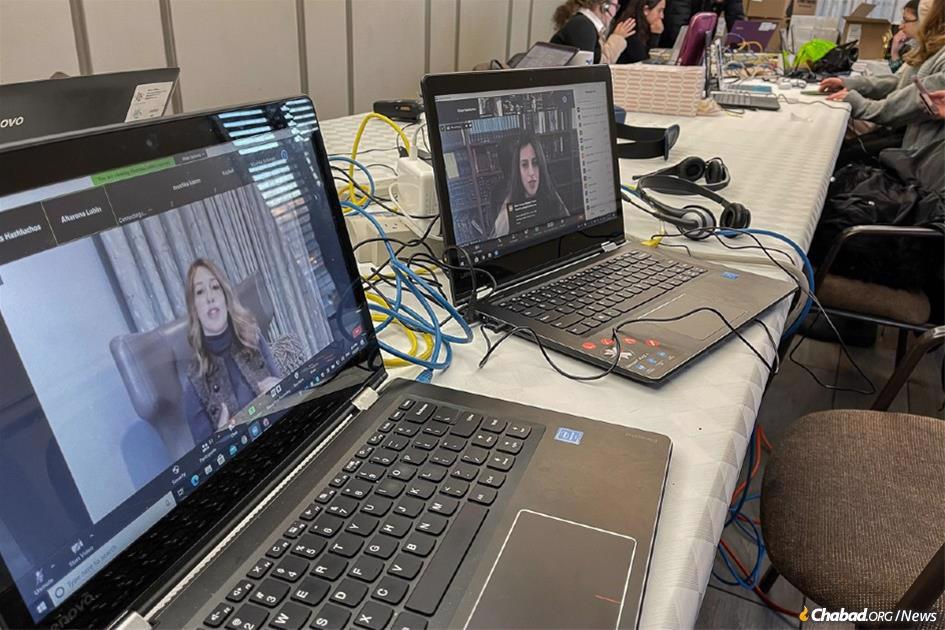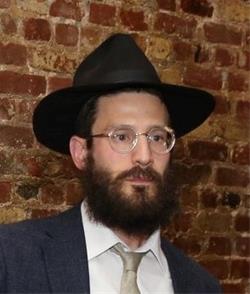The dizzying geographical scope of the Chabad-Lubavitch empire of emissaries around the world has long been a topic of conversation—an impressive phenomenon that inspires amazement and admiration on any day. When it comes time for the annual conference of emissaries with so many of them in one room, it is only that much more magnified.
But with such an enormous, far-flung cadre, there will always be someone who is not able to be present. Be it the remoteness of the location, a personal family celebration to attend or other logistical challenge, inevitably, some will not be able to attend.
This year’s iteration of the Gala Banquet of International Conference of Chabad-Lubavitch Women Emissaries (Kinus Hashluchos), however, truly represented every member. Instead of being staged in a cavernous hall in Brooklyn, N.Y., it was held in the limitless halls of the online world. Dubbed the “Gala Event,” much effort was invested to ensure that everyone got in on the action
And they sure did.
Starting with a resounding welcome from around the world, video footage took participants from New Zealand to Nigeria to Israel, and looped back to Uruguay, with the local shluchah (emissary) of each place wishing their welcome from fields, buildings and busy street corners.
The global spin did not relent, as the customary opening chapter of Psalms was recited by young girls bearing the name “Chaya Mushka” from every conceivable corner of the globe. The women’s conference, in its 31st year, takes place around the 22nd of the Hebrew month of Shevat, the yahrzeit of Rebbetzin Chaya Mushka Schneerson, of righteous memory, the wife of the Rebbe—Rabbi Menachem M. Schneerson, of righteous memory.
Defying the Odds From the Veranda
Rivkah Slonim from Binghamton, N.Y., addressed the audience with the many lessons and impressions to be learned from the Rebbetzin. Noting that Rebbetzin Chaya Mushka shied away from the public eye, Slonim recounted how in Leningrad in 1927, it was she who had the courage and the wits to shout from the veranda to her husband-to-be, the Rebbe, that the “Government was visiting!” a coded message that meant that her illustrious father, the Sixth Rebbe, was being arrested by the Communist Regime for his Jewish activities, and that everyone else should leave for safety.
“We, too,” exclaimed Slonim, “must draw the same courage and shout from our verandas that come what may—even a dreaded pandemic—we have the resources, wit and faith to power through.”
Her message was affirmed by Mrs. Henya Yehudis Lazar of Milan, Italy, who spoke of her personal experience surviving the Holocaust as a small girl and emerging all the more firm in faith and resilient in spirit. After poignantly taking pause to remember the shluchos who have passed over this year, raising her glass—a befitting, ornate silver goblet—Lazar movingly blessed her fellow shluchos with health, prosperity and success in their collective mission.
‘First Option: Over, Not Under’
The evening’s theme thereafter came to light, with footage from the Rebbe quoting the now-famous adage of the fifth Lubavitcher Rebbe, “The world says that if you face a challenge, first try to climb under it, if you cannot crawl under, then try climbing over it. But I say, Lechatchila Ariber!—‘Jump over it to begin with!’ ”
Indeed, this pandemic year of illness, quarantine and social distancing has made such an attitude the only option. Footage of one shluchah after another declaring the same thing brought this into stark relief: While the world shut down, they just knew that there was no choice other than to steel themselves and jump over any obstacle that may come. How? They may not know, but that they will indeed do it, they did know.
The subsequent feature films of individual stories from across the shlichus landscape broadcasted this theme loud and clear.
Ice Mikvah in Tasmania
Quarantine in one of the most remote places in the world with no mikvah? No matter. Chabad of Tasmania was on it—whether it made sense or not.
Mrs. Rochel Gordon of South Launceston, Tasmania, recounted how when the world shut down in mid-March, two thoughts struck her: What would happen with bringing in Passover goods to the island, and what about the mikvah? “For years, I made the exhausting trip to Melbourne every month,” says Gordon, “and it really dictated our life’s schedule here.” But with the specter of the country going indefinitely into lockdown, what was she to do?
“What I really thought about was a young bride-to-be I knew who would not be able to get married without a mikvah,” she says.
There was an old, derelict mikvah in Tasmania that had fallen out of use and was no longer halachically valid. After consulting with rabbinic authorities, the only option to revitalize it was to bring in fresh water in the form of ... blocks of ice. Such an item was impossible to procure locally, until out of the blue, on a Friday afternoon, the sole ice factory on the island called and promised to specially produce it for them if paid in full that day.
Needless to say, Gordon rallied, and there is now a kosher mikvah in Tasmania—and the wedding went through.
Hebrew School for 40K in a Day
It’s this attitude that makes the impossible happen: when inactivity is not an option, then activity occurs in almost miraculous ways.
In a feature video title “Triumph of Jewish Education,” viewers learned that when most major cities in the United States decided to put a lockdown in place on Friday, March 13, 2020, a large number of shluchos from around the country had one thought: What will happen regarding Hebrew school that Sunday?
The entire world had no idea what “lockdown” or “quarantine” meant. No one knew how long this would last. Yet there they were—a large group of shluchos on a conference call shortly before Shabbat and on numerous WhatsApp chats arranging virtual Hebrew school to open a mere 48 hours later.
With help from Rabbi Zalmy Lowenthal at the CTeen offices of Suite 302 of Merkos L’Inyonei Chinuch and under the directorship of Rabbi Moshe Kotlarsky, a miracle really did happen: Hebrew school kicked off on Sunday.
Attendance?
40,000 children. That’s thousand, not hundred.
In his address to the conference, Rabbi Moshe Kotlarsky, vice chairman of Merkos L’Inyonei Chinuch—the educational arm of the Chabad-Lubavitch movement—noted the tremendous feat and how it drove home an attitude Jews everywhere should assume: Obstacles aside, “we are here to do whatever it takes to finally bring about the redemption.”
Keynote From Istanbul
In her keynote address, Mrs. Chaya Chitrik of Istanbul, Turkey, elaborated on this theme. With powerful personal stories from her family history as well as life in a Muslim-majority country with such a strong Jewish background, she explained that just as Moses saw a bush that burned yet was not consumed, so it was with this generation’s Moses, the Rebbe. He saw a Jewish nation that had burned in the crematoriums of Europe, yet they were not consumed, she said. Galvanizing the attitude of “always over,” the Rebbe empowered the shluchim and shluchos “to tackle the darkness of this world and demonstrate that there’s never truly an obstacle in the way of G‑d’s vision for a better tomorrow.”
A Jewish Community in Argentina Comes Full-Circle
The final feature of the afternoon told the incredible story of the new shluchimto Bahia Blanca, Argentina. Rabbi Shmuel and Shterni Freedman. It was Jan. 2, 1987, when the new rabbi’s parents—Rabbi Moshe Freedman and his wife, Sarah—heard that the Rebbe had asked that menorahs be lit in all public spaces. Freedman told of the sheer impossibility of pulling off such an event in such short time, yet “If the Rebbe asked, lechatchilah ariber—we’re going to do it!”
Indeed, they did, fashioning a large 12-foot menorah in record time and getting many dignitaries and government officials on board for a large public menorah-lighting in front of city hall. From then on, it became a yearly tradition.
Sadly, in 2016, Moshe Freedman passed at the age of 57, and the community has keenly felt his loss. When his son, Rabbi Shmuel Freedman, and his wife, Shterni, announced that they would be moving back to take the helm of Chabad in Bahia Blanca last year, the community was overjoyed.
And then COVID-19 hit, and it seemed that they would have to wait indefinitely.
For Chanukah this past year, the local government wished to grant the late Rabbi Moshe Freedman a distinct honor at the public menorah-lighting, and his son and daughter-in-law very much wished to be there. Here, too, the lechatchilah ariber mindset put the wheels in motion: a local activist along with a government official there applied the necessary pressure, and within days, the Argentinian consulate in New York called the younger Rabbi Freedman that he should come pick up a special entry permit—and that they were staying open just for him to come and get it.
A whirlwind evening of packing landed the couple and their baby daughter 24 hours later in the Bahia Blanca airport at 6 p.m. on Thursday evening, the final night of Chanukah. From there, they were whisked to the menorah-lighting scheduled for 8 p.m., where a red carpet awaited them and the memory of their late father and father-in-law.
Such is the miracle of lechatchilah ariber.
After another message from the Rebbe, the event concluded with the traditional International Roll Call of shluchos from nearly every part of the globe—virtually, of course.





Join the Discussion